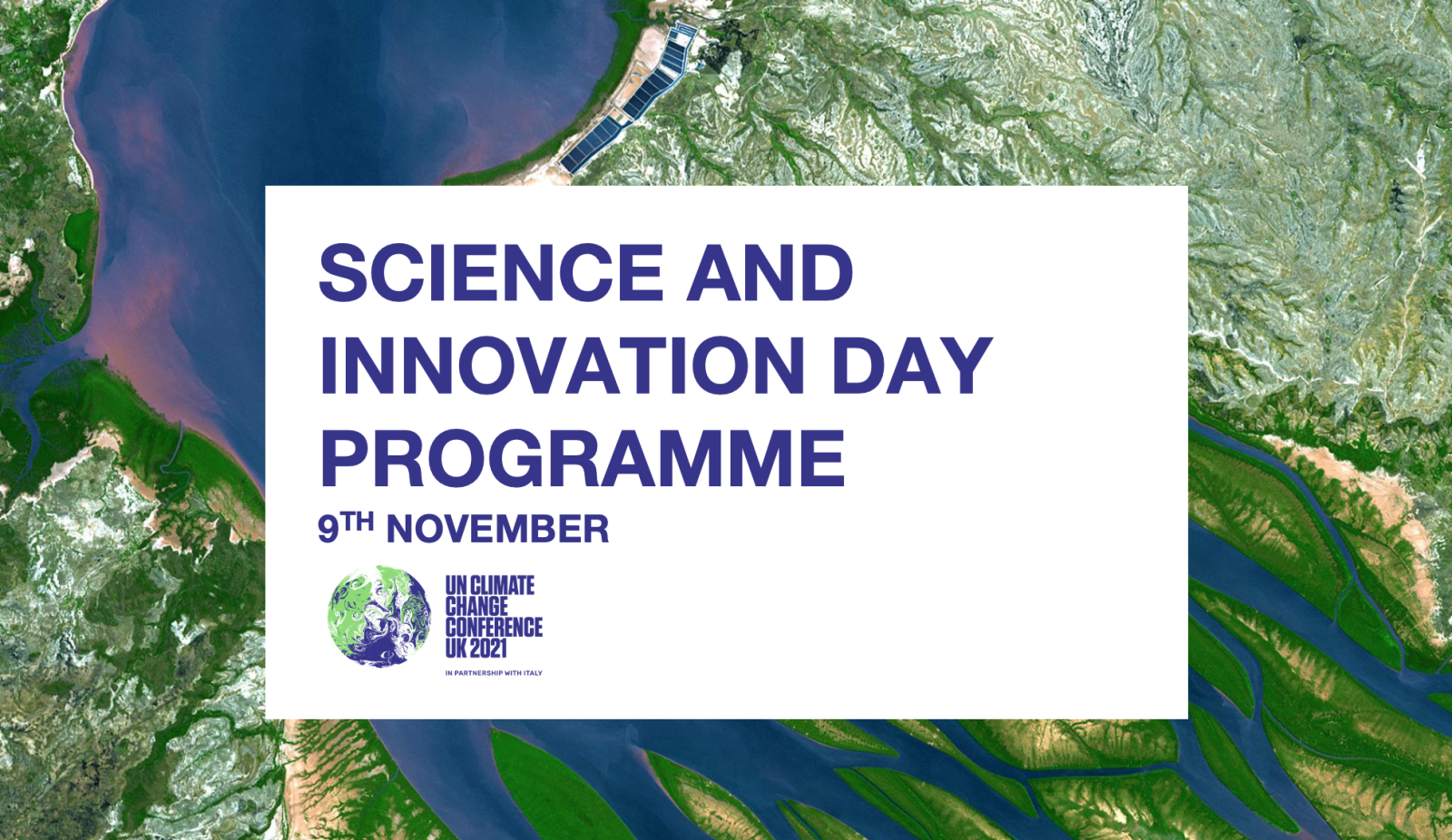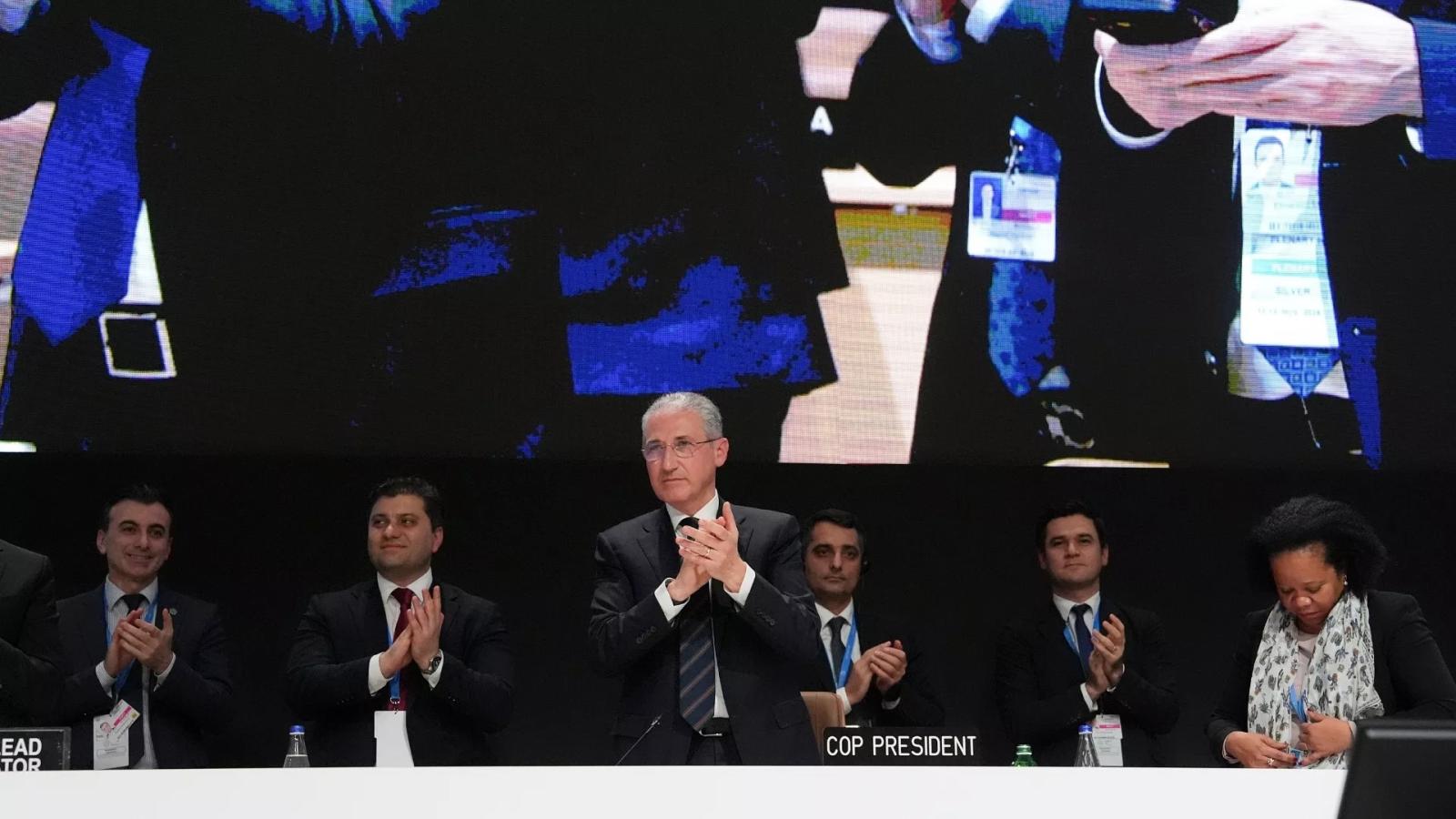
Martedì 9 novembre è il Science and innovation day alla COP 26, con un programma ricco di eventi da seguire in diretta.
Programma (ora di Glasgow)
09:15-10:15 | CLIMATE SCIENCE PARTNERSHIPS FOR GLOBAL ACTION
Ministerial keynote on the contribution made by UK researchers and their partners around the world to climate change research, early warning systems, adaptation, and policies. Expert panellists will share their views on how science can underpin and provide evidence for adaptations in policy, regulation, and development.
Speakers: Minister George Freeman MP, Prof. Penelope Endersby, Dr. Maggie Aderin-Pocock, Prof. Paul Monks, Prof. Charlotte Watts, Dr. Asha Mohammed
Diretta: https://www.youtube.com/watch?v=j6UIgQ9TyLs
09:30-11:00 | FROM RISK TO OPPORTUNITY: MAKING SCIENCE WORK FOR SOLUTIONS
The climate crisis paints a necessarily stark picture of our current trajectory, but rising to the challenge of climate change presents our best opportunity for generations to create a future we want. This session will bring together experts and citizens from across the world to discuss how to better use the knowledge on climate risks to guide action on climate towards ambitious, just and climate resilient trajectories. The event will explore what science can tell us about desirable futures, the benefits of ambitious climate action, and the solutions that can get us there.
Speakers: Minister George Freeman MP, Prof. Katharine Hayhoe, Dr. Emily Shuckburgh, Dr. Elena Manaenkova, Susan Nakyung Lee, Hana Al Hashimi, Nick Bridge, Jabri Ibrahim, Thandie Mwape
Diretta: https://unfccc-cop26.streamworld.de/live
10:00-11:15 | CLIMATE ACTION FOR HEALTH
Climate change is the greatest threat to global public health and wellbeing in the 21st century. This session brings together leaders from government, the health sector and climate change to set out the health arguments for ambitious global action on climate change. It also highlights the leadership role of health through the trusted voices of health professionals, and by demonstrating the global health sector’s commitment to building climate resilient and sustainable health systems.
Speakers: Rt Hon Sajid Javid MP, Minister Wendy Morton MP, Dame Emma Walmsley, Dr. Khaled Abdel-Ghaffar, Dr. Maria Neira, Hon. Aiyaz Sayed-Khaiyum, Admiral Rachel Levine, Henry Gonzalez, Julieta Martinez
Diretta: https://unfccc-cop26.streamworld.de/live
10:45-11:45 | INDIGENOUS SELF-DETERMINATION IN RESEARCH FOR BETTER CLIMATE OUTCOMES
Indigenous Peoples are key to ambitious climate action living in areas of high biodiversity and stark climate impacts. They are guardians of social and ecological systems crucial to countering and living with climate change, yet research is usually implemented without them. This discussion brings together Indigenous Peoples, policy makers, and research funders to highlight the benefits of integrating - not only Indigenous knowledge, but Indigenous Peoples - into research, and to promote Indigenous self-determination in research. This event is hosted by Inuit Tapiriit Kanatami, an organisation that advances and protects the interests of Inuit in Canada, who are leaders in progressing this research area.
Speakers: Minister George Freeman MP, Dr. Dalee Sambo Dorough, Natan Obed, Jennifer Hubbard, Lasse Bjørn, Carrie Grable, Rodd Laing
Diretta: https://www.youtube.com/watch?v=sggT1sT-c0M
11:30-13:00 | ROAR: SCIENCE & INNOVATION FOR CLIMATE ADAPTATION
Effective climate adaptation requires a paradigm shift that harnesses the full potential of science and innovation – and we need Results-Oriented Adaptation Research (ROAR) to realise this. The Adaptation Research Alliance (ARA), a global coalition of adaptation actors including researchers, policymakers, development organisations, funders and communities, have co-developed the Adaptation Research for Impact Principles as guiding tenets for all stakeholders engaged in climate adaptation.
Speakers: Minister Amanda Milling MP, Minister Keriako Tobiko, Minister Rodrigo Rodriguez Tornquist, Prof. Charlotte Watts, Prof. Maarten van Aalst, Prof. Izabella Koziell, Prof. Stephen Belcher, Prof. Maria del Pilar Bueno, Prof. Anand Patwardhan, Prof. Lucy Chappell, Dr. Aditya Bahadur, Dr. Rosalind West, Dr Alix Zwane, Max Cuvellier, Sunayana Sen, Jesse DeMaria-Kinney
Diretta: https://unfccc-cop26.streamworld.de/live
12:15-13:45 | INCLUSION IS KEY: HOW GENDER EQUALITY IMPROVES SCIENCE, TECH & INNOVATION FOR CLIMATE ACTION
This event will spotlight how increased diversity across the globe benefits climate action and highlight the important role gender responsive solutions play in improving Science and Innovation. The event will also celebrate the involvement of women in climate Science and Innovation as leaders.
Speakers: Minister George Freeman MP, Dr. Tamsin Edwards, Prof. Charlotte Williams, Dr. Rose Mwebaza, Dr. Sheila Ochugboju, Dr. Angela Naef, Pauline Lançon
Diretta: https://www.youtube.com/watch?v=CJHlVHKc3tg
13:30-14:45 | RESPONDING TO THE IPCC REPORT: KEEPING 1.5°C ALIVE
In the headline event of Science & Innovation Day, representatives from Parties, Observers and Non-State Actors will come together to discuss what is needed from the UNFCCC process, the COP26 outcome, and climate action over the coming years to respond to the IPCC Working Group I Contribution to the 6th Assessment Report and keep the 1.5°C degree goal within reach.
Speakers: COP President, Alok Sharma MP, Patricia Espinosa, Sir Patrick Vallance, Sir Molwyn Joseph, Anya Sitaram, Dr. Pasang Dolma Sherpa, Heeta Lakhani, Gonzalo Muñoz, Laurence Tubiana
Diretta: https://unfccc-cop26.streamworld.de/live
15:30-17:30 | ACCELERATING INNOVATION: COOPERATION FOR A NET ZERO FUTURE
As the flagship innovation event on the COP26 Science and Innovation Day, this event will bring together Ministers, CEOs and leaders from around the world to showcase clean energy solutions. The event will see the launch of new commitments that enhance international cooperation and ensure innovation delivers for all in order to meet our shared goals of the Paris Agreement.
Speakers: Secretary John Kerry, VP Frans Timmermans, Deputy Secretary David Turk, Minister Amanda Milling MP, Minister George Freeman MP, Minister Leonore Gewessler, Prof. Paul Monks, Dr. Noé van Hulst, Oluwadabira Abiola-Awe, Julie Shuttleworth, Mary Burce Warlick, Jen Austin, Marguerite Catanzaro, Elizabeth Press, James Mnyupe
Diretta: https://unfccc-cop26.streamworld.de/live


